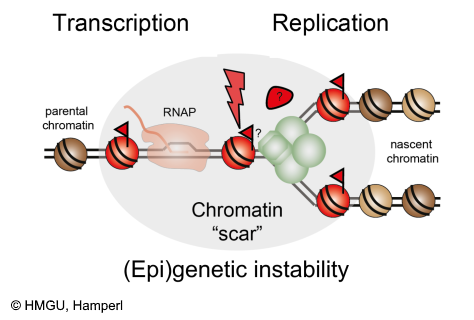Project description
Transcription and replication are the two major DNA metabolic processes in cells. Both machineries involve large protein complexes progressing along the DNA at high speed and for long distances. Importantly, a large body of evidence suggests that encounters between DNA and RNA polymerases can induce replication fork arrest, DNA breaks, recombination intermediates and mutations, thereby causing genetic instability1-3. However, their role how they affect the underlying chromatin structure and cause epigenetic instability is largely unexplored.
We recently established a cellular system that allows for induction of transcription-replication conflicts on episomal constructs in human cell lines4. In this project, we will use this highly tractable system and apply state-of-the-art molecular biology and biochemistry approaches to
(1) Determine direct structural and physical consequences of collisions to the underlying DNA template
(2) Characterize the epigenetic changes of collisions to the underlying chromatin template
(3) Identify novel factors necessary to prevent, tolerate or resolve collisions.
Together, these studies will give important insights into the role of transcription-replication conflicts as an endogenous source of epigenetic instability, a hallmark of cancer and many other human diseases.

Related literature
- Mirkin E V. & Mirkin SM. (2007). Replication Fork Stalling at Natural Impediments. Microbiol Mol Biol Rev. 71(1):13-35.
- Hamperl, S., & Cimprich, K. A. (2016). Conflict Resolution in the Genome: How Transcription and Replication Make It Work. Cell 167, 1455–1467 Cell.
- Sankar TS et al. (2016). The nature of mutations induced by replication-transcription collisions. Nature 7;535(7610):178-81.
- Hamperl S, et al. (2017). Transcription-Replication Conflict Orientation Modulates R-Loop Levels and Activates Distinct DNA Damage Responses. Cell 170(4):774-786.e19.
